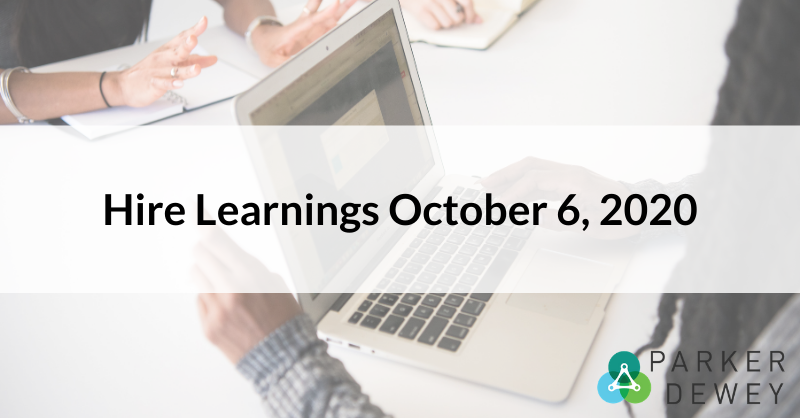.png)
What happens after the career fair?
As the pioneer of Micro-Internships, for the past six years, we’ve been highlighting the benefits of offering remote, short-term, paid, professional experience to college students as a core part of a recruiting strategy. So you’ll probably find it a bit ironic that I am a huge believer in career fairs and the value they can have for companies and college students alike.
To be clear, I am not talking about what many career fairs have become: students waiting in lines to hand resumes to companies they are already planning to apply to, and hopefully get a talking point or two they can use in an interview. Rather, career fairs should provide valuable opportunities for students to start forming relationships with professionals across a variety of organizations, helping them learn about different opportunities as part of their career exploration journey.
This is why I was so excited to read Julia Overton-Healy’s recent NACE article questioning, “If we kill career fairs, then what?” As she perfectly captured, career fairs can be a great way to “foster [the] student-employer engagement” that is vital for campus recruiting, especially given its impact on access, diversity, conversion, and retention. By eliminating them or making them more limited through “industry-specific / boutique event approaches,” we’re reducing the opportunity to form relationships that encourage the exploration that benefits companies and students alike.
The article also reflects the recent findings from our 2021 Campus Recruiting Student Sentiment Survey: Only 55% of students said they wanted to engage with employers through career fairs, while 93% reported their preference for engaging with employers via “real work experience with a company.” In the words of the students themselves, “I felt like...the sessions were not long enough to get a good feel for what the company does and what type of people they hire. I probably will avoid virtual fairs in the future.”
Jeffrey Moss, Founder and CEO
Articles of the Week
If We Kill Career Fairs, Then What? - NACE
How the HBCU Experience Builds Leaders - Strada Education
Micro-Internship Myths, Part One: The Hiring Manager Perspective - Parker Dewey
If We Kill Career Fairs, Then What? - NACE
“Despite doing everything imaginable and reasonable to promote a recent fair to our students, including direct email, social media, tabling, incentives, communications from employers, faculty support, and even cancelling class to accommodate the event, we didn’t get student numbers. And, as you know, low student numbers means employers are unhappy.”
Let’s talk about the “demise” of the career fair. Characterized as “a voracious monster with diminishing returns for many of us,” the career fair is losing traction amongst students and employers alike, especially with the job market shifts brought about by the pandemic. This article examines some of the catalysts behind the career fair’s declining popularity, plus alternative methods for student-employer engagement.
Related reading: A Pulse Check on the Career Fair
How the HBCU Experience Builds Leaders - Strada Education
“’Students see themselves in the support system they’ve decided to use,’ said Allen, whose university is one of the 28 HBCUs partnering with Strada in the HBCU Initiative. ‘We reflect a bit of the culture they come from. We look like people who might be their aunties, uncles, mothers, and fathers — and we are demanding excellence in all they do as they take this next step.’”
Did you know that Historically Black Colleges and Universities produce 20% of Black graduates in the United States, “even though they account for only 10 percent of all Black students who are enrolled”? This article takes a look at how and why HBCUs “generate pride and connect students to a sense of purpose.” And in parallel to the quote above from Tony Allen, president of Delaware State University, engaging HBCU students through Micro-Internships creates an opportunity for employee resource group members to work with college students and recent graduates with backgrounds similar to their own.
Related reading: Micro-Internships for Employee Resource Groups
Micro-Internship Myths, Part One: The Hiring Manager Perspective - Parker Dewey
“‘Going into it, I was worried [Micro-Internships] were going to make [life] harder. What was I going to be required to do? How do I get folks up-to-speed so they actually make a real impact and deliver value with the time that’s leftover? I have not found that to be the case.’”
In part one of this two-part webinar series, Parker Dewey founder and CEO, Jeffrey Moss, sat down with three professionals who have brought on Micro-Interns to get work done, discover talent, and make an impact at their organization. Brian, Jody, and Keagan shared what working with Micro-Interns is really like, answered audience questions, and shared the benefits they found from short-term projects facilitated by Parker Dewey.
Related reading: Micro-Internship Myths, Part Two: The Career Launcher Perspective
For more stories and insights on HR, recruiting, and diversity, click here to subscribe to our weekly newsletter Hire Learnings.




